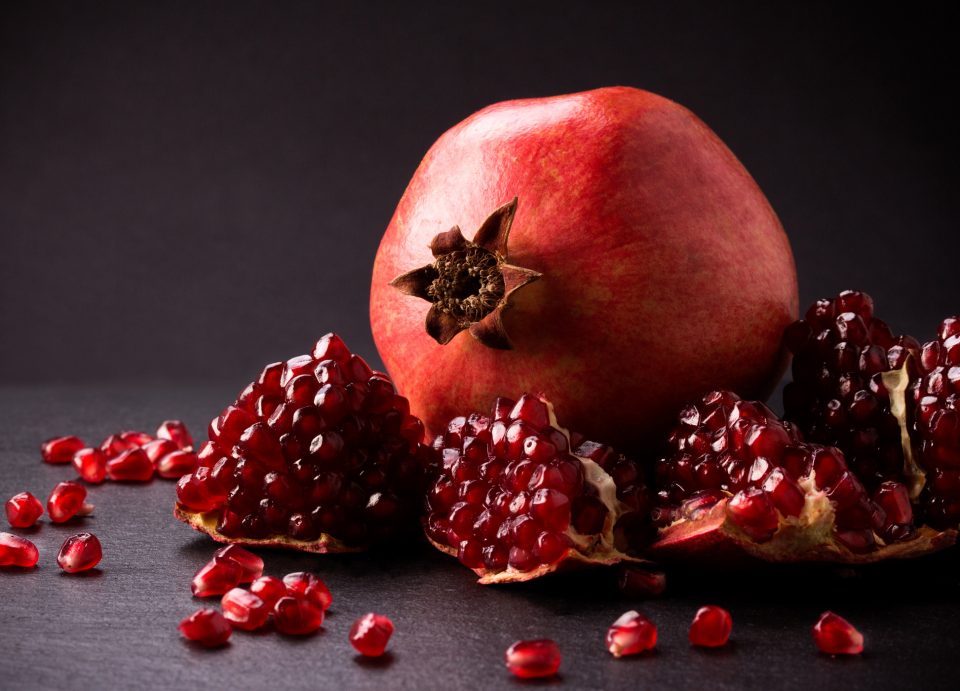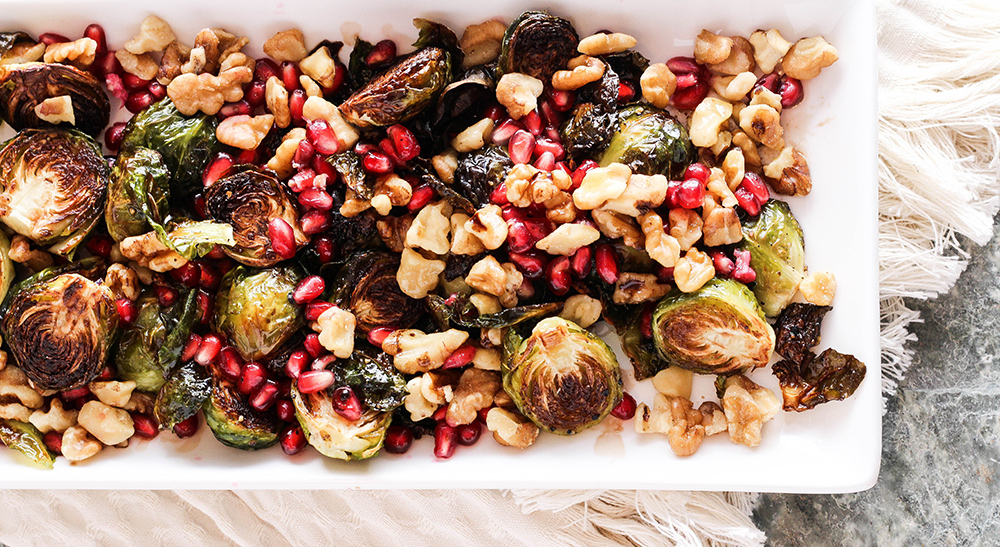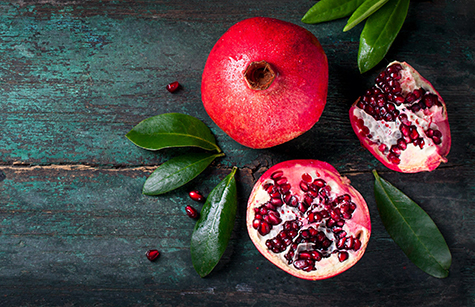Pomegranates Add Pizzazz to the Holidays


When pomegranates arrive on produce shelves, they remind me that fall is here and the holidays are upon us. Pomegranates are in season during fall and winter, and they deserve a place on every holiday table because of their beautiful color and cranberry-like flavor. In my AGE GRACEFULLY COOKBOOK, I have a recipe for Pomegranate Iced Tea that utilizes the juice of this amazing fruit along with its beautiful red seeds. It’s a festive drink for any occasion.
In my AGE BEAUTIFULLY COOKBOOK, I have a delicious recipe for Guacamole with Pomegranate Seeds, and if you love Brussels sprouts like I do, try my recipe for Brussels Sprouts with Pomegrante and Walnuts.
Brussels sprouts, pomegranate, and four common pantry ingredients are all that is needed to put together this colorful and crowd-pleasing side dish. Roasted Brussels sprouts are easy to make and filled with digestion-boosting fiber and beneficial antioxidants. Even those skeptical of this healthy cruciferous vegetable will love it alongside tart and juicy pomegranate and chopped walnuts. Enjoy this plant-based dish throughout the fall and winter seasons!
 Brussels Sprouts with Pomegranate & Walnuts
Brussels Sprouts with Pomegranate & Walnuts
Serves 2
Prep Time: 5 minutes
Cook Time: 40 minutes
Total TIme: 45 minutes
Ingredients
16 halved Brussels sprouts
2 Tbs. coconut oil
Salt and pepper to taste
⅓ cup pomegranate arils
⅓ cup walnut halves and pieces (toasted if desired)
2 Tbs. extra virgin olive oil
1 Tbs. balsamic vinegar
Instructions
Preheat oven to 400 degrees and prepare a baking sheet. Combine Brussels sprouts, coconut oil, and salt and pepper and spread cut side down on baking sheet. Place baking sheet on center rack and roast until Brussels sprouts are tender and browned in areas, 30-40 minutes.
Remove Brussels sprouts from oven and transfer to serving dish. Sprinkle with pomegranate and walnuts and drizzle with olive oil and balsamic vinegar before serving.
Amazing and Anti-Aging Pomegranates
Pomegranates seem to be the darling of the anti-aging community. It seems that there are new stories every day touting the health benefits of this large red fruit native to Iran and northern India. Sure the dark red arils or edible seeds of the pithy fruit are tart and tasty, but do they deserve all the hype they’re getting? I think so. I’ve found some compelling studies and recommendations by trusted sources telling me how pomegranates can help prevent cancer, reduce inflammation and risk of heart disease, and even fight dental plaque.
So breaking through the leathery outer skin of the pomegranate is worth the trouble, as you’ll see below. I peel it and pull it apart under water so that the juice that inevitably comes out of the broken arils doesn’t stain my clothes or my countertop. The pulpy white pith floats to the top of my bowl of water while the arils sink to the bottom. I continue breaking apart the fruit until I have released all of the powerful dark red seeds. I throw away the peel and the pith, but I eat the seeds out of hand or toss them into fruit salads for a pop of color and a tangy bite.
 That dark red color is an indication of anthocyanins, an antioxidant that’s been shown to inhibit the growth of cancer cells. Anthocyanins also improve the function of our capillaries, therefore delivering blood and oxygen to every possible part of our body. Pomegranates are incredibly bountiful when it comes to these antioxidants that are also found in grapes, red wine, and cranberries. In his book, The Most Effective Natural Cures on Earth, Jonny Bowden, Ph.D., C.N.S. says “Pomegranate juice may just turn out to be one of the great natural weapons against heart disease.”
That dark red color is an indication of anthocyanins, an antioxidant that’s been shown to inhibit the growth of cancer cells. Anthocyanins also improve the function of our capillaries, therefore delivering blood and oxygen to every possible part of our body. Pomegranates are incredibly bountiful when it comes to these antioxidants that are also found in grapes, red wine, and cranberries. In his book, The Most Effective Natural Cures on Earth, Jonny Bowden, Ph.D., C.N.S. says “Pomegranate juice may just turn out to be one of the great natural weapons against heart disease.”
Health advisor, Dr. Andrew Weil cites two studies on cancer research and pomegranate juice (one from UCLA and one conducted at the University of Wisconsin) when he writes, “Pomegranate juice may turn out to be very useful in the treatment of prostate cancer and, perhaps, its prevention, as well.”
WebMD Health News had this to say about pomegranates: “Pomegranate juice has been touted for years as having many health benefits, and now a new study says it can ward off a number of complications in kidney disease patients on dialysis.” It seems the antioxidants in pomegranate juice reduced inflammation and damage caused by free radicals. The post goes on to say, “other research has shown that patients who drank pomegranate juice showed an improvement in cardiovascular risk factors, such as reduced blood pressure and fewer cardiovascular events.” Read the full story here.
Prevention Magazine noted that the pomegranate “is one potent protector that is worth smiling about—because polyphenol-packed pomegranate juice can kill the S. mutans bacteria, a main cause of cavities, found Pace University researchers.”